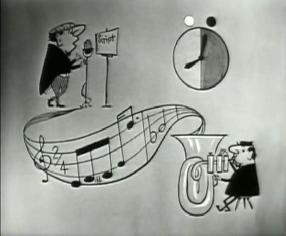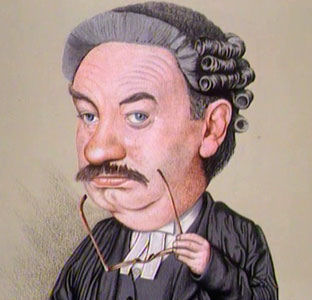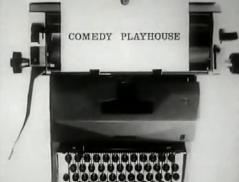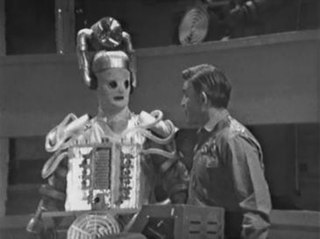Related Research Articles

Do Not Adjust Your Set (DNAYS) is a British television series produced originally by Rediffusion, London, then, by the fledgling Thames Television for British commercial television channel ITV from 26 December 1967 to 14 May 1969. The show took its name from the message that was displayed when there was a problem with transmission or technical difficulties.

Out of the Unknown is a British television science fiction and horror anthology drama series, produced by the BBC and broadcast on BBC2 in four series between 1965 and 1971.

Hancock's Half Hour was a BBC radio comedy, and later television comedy series, broadcast from 1954 to 1961 and written by Ray Galton and Alan Simpson. The series starred Tony Hancock, with Sidney James; the radio version also co-starred, at various times, Moira Lister, Andrée Melly, Hattie Jacques, Bill Kerr and Kenneth Williams. The final television series, renamed simply Hancock, starred Hancock alone.

Rumpole of the Bailey is a British television series created and written by the British writer and barrister John Mortimer. It starred Leo McKern as Horace Rumpole, a middle-aged London barrister who defended a broad variety of clients, often underdogs. The popularity of the TV series led to the stories being presented in other media, including books and radio.
Escape is an American radio drama. It was radio's leading anthology series of high-adventure radio dramas, airing on CBS from July 7, 1947 to September 25, 1954.

Comedy Playhouse is a long-running British anthology series of one-off unrelated sitcoms that aired for 128 episodes from 1961 to 1975. Many episodes later graduated to their own series, including Steptoe and Son, Meet the Wife, Till Death Us Do Part, All Gas and Gaiters, Up Pompeii!, Not in Front of the Children, Me Mammy, That's Your Funeral, The Liver Birds, Are You Being Served? and particularly Last of the Summer Wine, which is the world's longest running sitcom, having run from January 1973 to August 2010. In all, 27 sitcoms started from a pilot in the Comedy Playhouse strand.

Play for Today is a British television anthology drama series, produced by the BBC and transmitted on BBC1 from 1970 to 1984. During the run, more than three hundred programmes, featuring original television plays, and adaptations of stage plays and novels, were transmitted. The individual episodes were between fifty and a hundred minutes in duration. A handful of these plays, including Rumpole of the Bailey, subsequently became television series in their own right.

Theatre 625 is a British television drama anthology series, produced by the BBC and transmitted on BBC2 from 1964 to 1968. It was one of the first regular programmes in the line-up of the channel, and the title referred to its production and transmission being in the higher-definition 625-line format, which only BBC2 used at the time.

The Tenth Planet is the partly missing second serial of the fourth season in the British science fiction television series Doctor Who, which was first broadcast in four weekly parts from 8 to 29 October 1966. It was William Hartnell's last regular appearance as the First Doctor, and the first story to feature the process later termed "regeneration", whereby the lead character, The Doctor, undergoes a transformation into a new physical form. Patrick Troughton makes his first, uncredited appearance as the Second Doctor.
The Power of the Daleks is the completely missing third serial of the fourth season of British science fiction television series Doctor Who, which was first broadcast in six weekly parts from 5 November to 10 December 1966. It is the first full story to feature Patrick Troughton as the Second Doctor.

Several portions of the long-running British science-fiction television programme Doctor Who are no longer held by the BBC. Between 1967 and 1978, the BBC routinely deleted archive programmes for various practical reasons—lack of space, scarcity of materials, and a lack of rebroadcast rights. As a result, 97 of 253 episodes from the programme's first six years are currently missing, primarily from seasons 3, 4 and 5, leaving 26 serials incomplete. Many more were considered lost until recovered from various sources, mostly overseas broadcasters.
The Macra Terror is the completely missing seventh serial of the fourth season in the British science fiction television series Doctor Who, which was first broadcast in four weekly parts from 11 March to 1 April 1967.
Hammer House of Mystery and Suspense, aired in the United States as Fox Mystery Theater, is a British mystery anthology television series produced in Britain in 1984 by Hammer Film Productions. Though similar in format to the 1980 series Hammer House of Horror, the Mystery and Suspense series had feature-length episodes, usually running around 70 minutes without commercials.
The Dad's Army missing episodes are lost episodes and sketches of the British television sitcom Dad's Army. The programme ran for nine series from 31 July 1968 to 13 November 1977. Three out of six episodes from the second series and two of the four Christmas sketches are missing because, at that time, the BBC routinely reused videotape as a cost-saving measure.
John Summer Gorrie is an English director and screenwriter. He began his career as an actor, but in early 1963 he completed the BBC's directors' course. His first assignments as a director were for the soap opera Compact and the anthology series Suspense. He directed the Doctor Who serial The Keys of Marinus.

Out of This World is a British science fiction anthology television series made by the ITV franchise ABC Weekend TV for ITV. It was broadcast on ITV in 1962. A spin-off from the Armchair Theatre anthology series, each episode was introduced by the actor Boris Karloff. Many of the episodes were adaptations of stories by science fiction writers including Isaac Asimov, Philip K. Dick and Clifford D. Simak. The series is described by the British Film Institute as a precursor to the BBC science fiction anthology series Out of the Unknown, which was created and produced by Out of This World creator Irene Shubik after she left ABC.
Irene Shubik was a British television producer and story editor, known for her contribution to the development of the single play in British television drama. Beginning her career in television at ABC Weekend TV, she worked on Armchair Theatre as a story editor, where she devised the science fiction anthology series Out of this World.

Lost television broadcasts are mostly those early television programs which cannot be accounted for in studio archives.

Doraemon is the first anime TV series based on Fujiko F. Fujio's manga of the same name. It was produced by Nippon TeleMovie Productions. It aired from April 1, 1973, to September 30, 1973.

Billy Bunter of Greyfriars School is a BBC Television show broadcast from 1952 to 1961. It was based on the Greyfriars School stories, written by author Charles Hamilton under the pen name Frank Richards. Hamilton wrote all of the scripts for the television show.
References
- Cutler, Colin (January 2007). "Out of the Unknown Clips Guide". Zeta Minor. Retrieved 13 February 2008.
- Fulton, Roger (1997). The Encyclopedia of TV Science Fiction (3rd ed.). London: Boxtree. pp. 289–300. ISBN 0-7522-1150-1.
- Ward, Mark (2004). Out of the Unknown: A Guide to the legendary BBC series. Bristol: Kaleidescope. ISBN 1-900203-10-3.